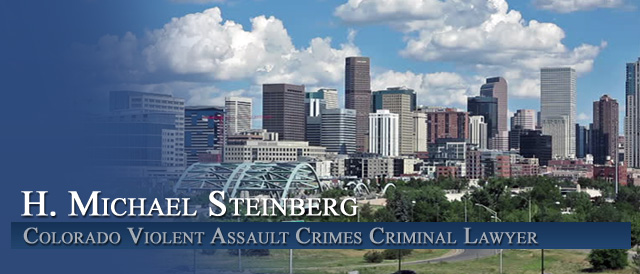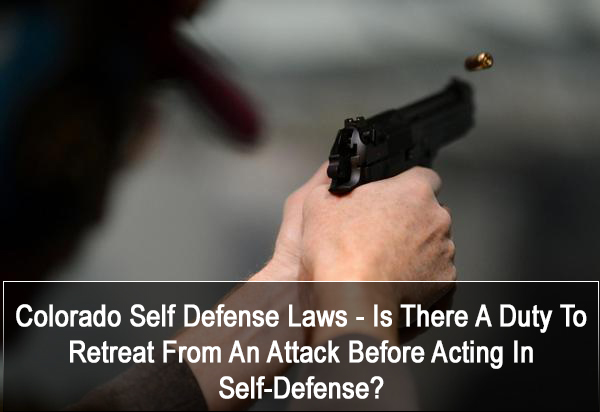





Jun 22
Colorado Self Defense Laws – Is There A Duty To Retreat From An Attack Before Acting In Self Defense?

By H. Michael Steinberg Colorado Assault And Violent Crimes Criminal Defense Lawyer – Attorney
Colorado Self Defense Laws – Is There A Duty To Retreat From An Attack Before Acting In Self Defense? – The assertion of the right of self defense in Colorado assault cases can be complex. An important component of exercising your right to self defense is understanding whether you have a duty, if attacked, to retreat from a confrontation.
This article addresses that precise issue.
There Are Three Exceptions To The Successful Use Of The Colorado Right To Act In Self Defense
While the defense of self defense may not be available based on the facts of a case, for reasons that are made clear in the law out in the law, circumstances in which a person is not justified in using any degree of physical force in self-defense against another. There are other exceptions that may stop the use of the defense under circumstances when self-defense would otherwise apply to the facts of a case.
These exceptions are referred to as:
1. The Provocation Exception,
2. The Initial Aggressor Exception, and
3. The Combat by Agreement Exception
I have addressed these exceptions in other articles: (click on the following links to access)
Is There A Duty To Retreat If A Victim Of An Assault Can Safely Do So?
The short answer is NO, not unless you are the initial aggressor.
What follows is the Colorado Jury Instruction (which breaks out the law of self defense in Colorado as of 2017):
Use of Non-deadly Physical Force (Defense of Person)
The evidence presented in this case has raised the affirmative defense of “defense of person,” as a defense to [ CRIME CHARGED].
The defendant was legally authorized to use physical force upon another person without first retreating if:
1. he used that physical force in order to defend himself or a third person from what he reasonably believed to be the use or imminent use of unlawful physical force by that other person, and
2. he used a degree of force which he reasonably believed to be necessary for that purpose, and
3. he did not, with intent to cause bodily injury or death to another person, provoke the use of unlawful physical force by that other person.
4. he was not the initial aggressor, or, if he was the initial aggressor, he had withdrawn from the encounter and effectively communicated to the other person his intent to do so, and the other person nevertheless continued or threatened the use of unlawful physical force.
5. the physical force involved was not the product of an unauthorized combat by agreement.
The prosecution has the burden to prove, beyond a reasonable doubt, that the defendant’s conduct was not legally authorized by this defense. In order to meet this burden of proof, the prosecution must disprove, beyond a reasonable doubt, at least one of the above numbered conditions
After considering all the evidence, if you decide the prosecution has failed to meet this burden of proof, then the prosecution has failed to prove the defendant’s conduct was not legally authorized by this defense, which is an essential element of [the crime charged]. In that event, you must return a verdict of not guilty of that offense.
While there is a general rule of “no duty to retreat” the no-duty to retreat rule does NOT apply when a non-aggressor pursues an initial aggressor who has withdrawn because in that situation, the non-aggressor in fact becomes the aggressor.
In the case of the use of DEADLY FORCE, Colorado law adds this additional jury instruction
Use of Deadly Physical Force (Defense of Person)
The evidence presented in this case has raised the affirmative defense of “deadly physical force in defense of person,” as a defense to [insert name of the offense].
The defendant was legally authorized to use deadly physical force upon another person without first retreating if:
1. he used that deadly physical force in order to defend himself or a third person from what he reasonably believed to be the use or imminent use of unlawful physical force by that other person, and
2. he reasonably believed a lesser degree of force was inadequate, and
3. [he had a reasonable ground to believe, and did believe, that he or another person was in imminent danger of being killed or of receiving great bodily injury.]
[the other person was using or reasonably appeared about to use physical force against an occupant of a dwelling or business establishment while committing or attempting to commit burglary.]
[the other person was committing or reasonably appeared about to commit kidnapping, robbery, sexual assault, or assault in the first or second degree.] [, and]
[4. he did not, with intent to cause bodily injury or death to another person, provoke the use of unlawful physical force by that other person.]
[5. he was not the initial aggressor, or, if he was the initial aggressor, he had withdrawn from the encounter and effectively communicated to the other person his intent to do so, and the other person nevertheless continued or threatened the use of unlawful physical force.]
[6. the physical force involved was not the product of an unauthorized combat by agreement.]
The prosecution has the burden to prove, beyond a reasonable doubt, that the defendant’s conduct was not legally authorized by this defense. In order to meet this burden of proof, the prosecution must disprove, beyond a reasonable doubt, at least one of the above numbered conditions.
After considering all the evidence, if you decide the prosecution has failed to meet this burden of proof, then the prosecution has failed to prove the defendant’s conduct was not legally authorized by this defense, which is an essential element of [insert name of offense]. In that event, you must return a verdict of not guilty of that offense.
After considering all the evidence, if you decide the prosecution has met this burden of proof, then the prosecution has proved the defendant’s conduct was not legally authorized by this defense. In that event, your verdict concerning the charge of [insert name(s) of offense(s)] must depend upon your determination whether the prosecution has met its burden of proof with respect to the remaining elements of that offense.
The Right To Assert Self Defense At Trial In Colorado Is Broad And If There Is ANY CREDIBLE EVIDENCE To Support The Defense – The Judge Must Instruct The Jury On The Defense
The accused in an assault case is entitled to raise the affirmative defense of self-defense to justify the use of physical force-including deadly force whenever the record contains any credible evidence tending to establish the defense. § 18-1-407(1)
A Judge is under a legal obligation to help the Defendant “tailor” the self-defense instructions to the particular facts and circumstances of the case so a jury can properly deliberate on the law of self-defense when they are deciding whether the State has proven the charge beyond a reasonable doubt.
Because Colorado follows the “doctrine of no-retreat” – which permits non-aggressors who are otherwise entitled to use physical force in self-defense to do so without first retreating, or seeking safety by means of escape, the Judge must instruct on that law before the jury decides a Defendant’s fate.
Under Colorado law, only initial aggressors must retreat before using force in self-defense.
As long as a Defendant is not the initial aggressor – he or she is entitled to a jury instruction on the doctrine of no-retreat when the facts of the case raise the issue of retreat – as long as the evidence supports a jury finding that the defendant was not the initial aggressor.
The jury is required to understand – while they deliberate on guilt or innocence – that a Defendant who is not the initial aggressor does not need to retreat before using force in self-defense. It is incumbent that a Judge make certain the jury understands the law.
Again, where the the facts of a case support the giving of a no-retreat instruction where it is undisputed that the accused was NOT initial aggressor, a Defendant who has the opportunity to escape from the danger of an assault but chooses not to, is not in violation of the law.
Colorado Self Defense Laws – Is There A Duty To Retreat From An Attack Before Acting In Self Defense?
If you found any of the information I have provided on this web page article helpful please click my Plus+1 or the Share buttons for Twitter and Facebook below so that others may also find it.
The reader is admonished that Colorado criminal law, like criminal law in every state and at the Federal level, changes constantly. The article appearing above was accurate at the time it was drafted but it cannot account for changes occurring after it was uploaded.
If, after reading this article, you have questions about your case and would like to consider retaining our law firm, we invite you to contact us at the Steinberg Colorado Criminal Defense Law Firm – 303-627-7777.
Never stop fighting – never stop believing in yourself and your right to due process of law. You will not be alone in court, H. Michael will be at your side every step of the way – advocating for justice and the best possible result in your case. H. Michael Steinberg is passionate about criminal defense. His extensive knowledge and experience of Colorado Criminal Law gives him the edge you need to properly handle your case
 ABOUT THE AUTHOR: H. Michael Steinberg – Email The Author at:
ABOUT THE AUTHOR: H. Michael Steinberg – Email The Author at:
A Denver Colorado Criminal Defense Lawyer – or call his office at 303-627-7777 during business hours – or call his cell if you cannot wait and need his immediate assistance – please call 720-220-2277.
“A good criminal defense lawyer is someone who devotes themselves to their client’s case from beginning to end, always realizing that this case is the most important thing in that client’s life.”
You should be careful to make a responsible choice in selecting a Colorado Criminal Defense Lawyer. We encourage you to “vet” our firm. Over the last 30 plus years – by focusing ONLY on Colorado criminal law – H. Michael has had the necessary time to commit to the task of constantly updating himself on nearly every area of criminal law, to include Colorado criminal law and procedure and trial and courtroom practice. H. Michael works hard to get his clients the best possible results in and out of the courtroom. He has written, and continues to write, extensively on Colorado criminal law and he hopes this article helps you in some small way – Colorado Self Defense Laws – Is There A Duty To Retreat From An Attack Before Acting In Self Defense?

You Might Also Enjoy:
- Second Degree Assault – 18-3-203 – Dropping Mandatory Sentences To Prison Changes Everything – Colorado Criminal Law
- Colorado Criminal Law- Courts Make It Hard To Disqualify The District Attorney – 20-1-107
- 2016 Colorado Police May Do A Pat Down Search If You Ask Them For A Courtesy Ride
- Colorado Criminal Law – Rights Of A House Guest Vs Colorado Trespass Laws
- Understanding How To Behave In A Colorado County Jail – A Few Basics












